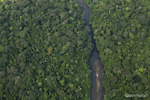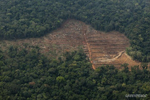
Aerial view of Herakles Farm’s oil palm plantation nursery. Photo by: © Greenpeace/Alex Yallop.
Greenpeace has just accused one of the world’s most controversial oil palm companies, Herakles Farms, of colluding with top government officials to sell off illegally logged timber to China. According to a new report from the environmental group, a stealth agreement between Cameroon’s Minister of Forestry, Ngole Philip Ngwese, and Herkales Farms—through a shell company—could torpedo the country’s agreement with the EU for better timber management.
“This was a deliberate attempt to hide an illegal decision taken in favor of Herakles Farms,” said Irene Wabiwa, Head of Greenpeace Africa’s Forest Campaign.
According to the report, in January of this year Ngwese granted sale of logs from a 2,500 hectare forest plot located inside Herkales Farms’ concession. The sale was granted for a new company called Uniprovince. But Uniprovince was acquired by a local subsidiary of Herakles Farms, Sithe Global Sustainable Oils Cameroon (SGSOC) Cameroon Holding Limited, in 2013.
 Aerial view of deforestation by Herakles Farms. Photo by: © Jan-Joseph Stok/Greenpeace. |
“National law specifies that [logging]…permits can only be awarded by a competitive public auction, something that did not occur before Uniprovince was allocated the title,” reads the report.
Under Cameroonian law, Herakles Farms cannot sell timber, because it is not a commercial logging company. Moreover, the company has stated several times in the past that it had no intent to sell the timber it felled for its palm oil plantation. But by acquiring Uniprovince, the palm oil company may be able to move its timber regardless.
In fact, Greenpeace says that Herkales Farms has cut off the ends of sawn timber, originally marked HF (Herkales Farms), and remarked them with UP (Uniprovince) in a deliberate attempt to smuggle the timber abroad. Some timber has already been transferred to the port in Douala.
The report also notes that Uniprovince will pay significantly less in taxes than most other commercial loggers: 17 times less than the average deal in fact.
“This constitutes an important loss of revenue for the Cameroon State treasury, and also for local communities who are supposed to receive royalties from the area tax,” reads the report. “The question that remains unanswered is why Uniprovince benefitted from such favorable treatment at the expense of the state coffers.”
These new allegations come after years of controversy and drama surrounding Herakles Farms’ arrival in Cameroon in 2009.
Proposing to clear-cut 70,000 hectares of dense rainforest at the edge of several protected areas for a massive palm oil plantation, the company was condemned by numerous environmentalists, scientists, and some local communities. Conservationists warned that several endangered species would lose key habitat with surveys showing the forest concession in question had populations of the world’s most threatened chimpanzee subspecies, the Nigeria-Cameroon chimpanzee (Pan troglodytes ellioti); forest elephants (Loxodonta cyclotis); drill monkeys (Mandrillus leucophaeus); Preuss’s red colobus monkey (Procolobus preussi); and red-capped mangabey (Cercocebus torquatus). Meanwhile, local activists accused the company of land grabbing and depriving communities of access to their traditional forests.
 Log marked with HF for Herakles Farms. Greenpeace has documented the company cutting off the HF mark and replacing it with UP for Uniprovince. Photo by: © Greenpeace. |
In 2012, after years of dubbing themselves environmentalists, Herakles Farms announced it was pulling out of the Roundtable on Sustainable Palm Oil (RSPO), currently the world’s most stringent regulator of palm oil production. Last year, the government finally approved Herkales Farms’ plantation—after shutting it down for a time—but slashed the concession size by over 70 percent to 20,000 hectares. Then earlier this year the company was hit with a $4.6 million fine in a discrimination suit.
“Herakles Farms has been able to operate with impunity in Cameroon for several years now despite lacking all the required legal documentation/approval to do so,” said Wabiwa. “The company claims that profits from any of its timber would go to the Cameroonian people, but its current attempts to commercialize illegal wood demonstrates that its true agenda is simply to rescue a financially stricken project.”
The push to sell the timber abroad could also weaken a landmark agreement between Cameroon and the EU, according to Greenpeace. In 2011, Cameroon entered into a Voluntary Partnership Agreement (VPA) with the EU to vastly improve its timber sector in exchange for access to EU markets, known as a Action Plan on Forest Law Enforcement, Governance and Trade (FLEGT).
 Oil palm nursery. Photo by: © Jan-Joseph Stok/Greenpeace. |
“Through this agreement Cameroon commits to ensuring that all timber production is legal no matter the final destination market,” reads the report. But so far the EU has not responded to repeated allegations that Herakles Farms is intending to sell timber broad.
Moreover, the issue raises questions of how the EU’s FLEGT program will deal with timber from clearcut plantations, an issue throughout the tropics.
“VPAs were conceived with so-called ‘selective’ logging in production forests in mind,” says the report. “More recent data, however, indicate that timber from forest conversion is also of increasing significance in tropical production and in Cameroon could in fact soon
account for a large part of the total national timber production.”
Greenpeace calls on the government of Cameroon to cancel the logging permit with Uniprovince and seize all timber, adding that “Herakles Farms, Uniprovince, and government officials responsible for granting illegal authorizations should be investigated and prosecuted.”
Moreover the group calls on the EU and the Cameroon government to take another look at their VPA to address the issue of timber from plantation sites. In the meantime, the EU should classify timber from Cameroon as “high risk.”
“Herakles Farms is a test case for the credibility of forest governance in the VPA era. The EU will have to show it is able to get its partner, Cameroon, to honor the partnership agreement,” said Wabiwa.
Related articles
U.S. palm oil company fined $4.6m in discrimination suit
(01/08/2014) Herakles Farms, an American agribusiness company, has been ordered to pay $4.6 million by a court in Cameroon over alleged discrimination in its hiring practices.
Controversial palm oil project approved in Cameroon rainforest

(11/26/2013) A controversial palm oil project set in the West African rainforest in Cameroon has won a three-year provisional lease to convert 20,000 hectares of land for plantations. The project, which is run by U.S.-based Herakles Farms, has been heavily opposed by environmental groups who say it will destroy blocks of wildlife-rich forest.
Controversial oil palm company now accused of illegal logging in Cameroon rainforest
(09/18/2013) Environmental group, Greenpeace, has accused Herakles Farms of illegal logging in Cameroon after the company has already been lambasted by scientists and conservationists for its plan to build a 70,000 hectare palm oil plantation in one of Africa’s most biodiverse rainforests. Herakles Farms has been under fire from green groups—both in Cameroon and abroad—for years over its oil palm plantation plans, including facing protests from locals who live in the forest to be cleared.
Endangered chimps and forest elephants found in rainforest to be logged for palm oil

(08/08/2013) A biological survey of forests slated for destruction for a palm oil project in Cameroon has uncovered 23 species of large mammals, including the world’s most endangered chimpanzee subspecies, the Nigeria-Cameroon chimpanzee (Pan troglodytes ellioti). The project in question, operated by U.S.-based company Herakles Farms, has come under stiff criticism both locally and abroad for threatening one of Africa’s most biologically rich forest lands and arguably undercutting local peoples’ access to traditional lands.
Deforestation rate falls in Congo Basin countries

(07/22/2013) Deforestation has fallen in Congo Basin countries over the past decade despite a sharp increase in the rate of forest clearing in the Democratic Republic of the Congo, according to a new study published in the Philosophical Transactions of the Royal Society B as part of a set of 18 papers on the region’s tropical forests. The special issue, which was put together by Oxford University’s Yadvinder Malhi, covers a range of issues relating to the rainforests of the Congo Basin, including deforestation, the impacts of global change, the history and key characteristics of the region’s forests, and resource extraction, among others.
Controversial palm oil project in Cameroon rainforest to resume
(06/06/2013) The Cameroonian government has lifted the suspension on controversial palm oil project in the northwestern part of the Central African nation, reports the AFP.
Controversial palm oil project halted in Cameroon
(05/24/2013) An American company has halted work on a controversial palm oil project in Cameroon due to opposition from local communities and environmentalists, reports Reuters.
Controversial palm oil project concession in Cameroon is 89 percent ‘dense natural forest’

(02/21/2013) Satellite mapping and aerial surveys have revealed that a controversial palm oil concession in Cameroon is almost entirely covered by “dense natural forest,” according to a new report by Greenpeace. The activist group alleges that the concession, owned by Herakles Farms, is under 89 percent forest cover. The U.S.-based corporation intends to build a 70,000 hectare palm oil plantation in a region surrounded by four protected areas, including Korup National Park, but has faced stiff criticism from numerous environmental groups as well as conflict with locals.
Photos reveal destruction of Cameroon rainforest for palm oil

(11/26/2012) Newly released photos by Greenpeace show the dramatic destruction of tropical forest in Cameroon for an oil palm plantation operated by SG Sustainable Oils Cameroon (SGSOC), a subsidiary of the U.S. company Herakles Farm. The agriculture company is planning to convert 73,000 hectares to palm oil plantations on the edge of several protected areas, but has faced considerable opposition from environmentalists and some local communities. In addition to the aerial photos, Greenpeace alleges that ongoing forest clearing by Herakles is illegal since the companies 99-year lease has yet to be fully approved by the Cameroonian government.
Activists protesting controversial Cameroon palm plantation arrested
(11/17/2012) Activists protesting conversion of rainforest to an oil palm plantation have been arrested in Cameroon, reports Greenpeace.